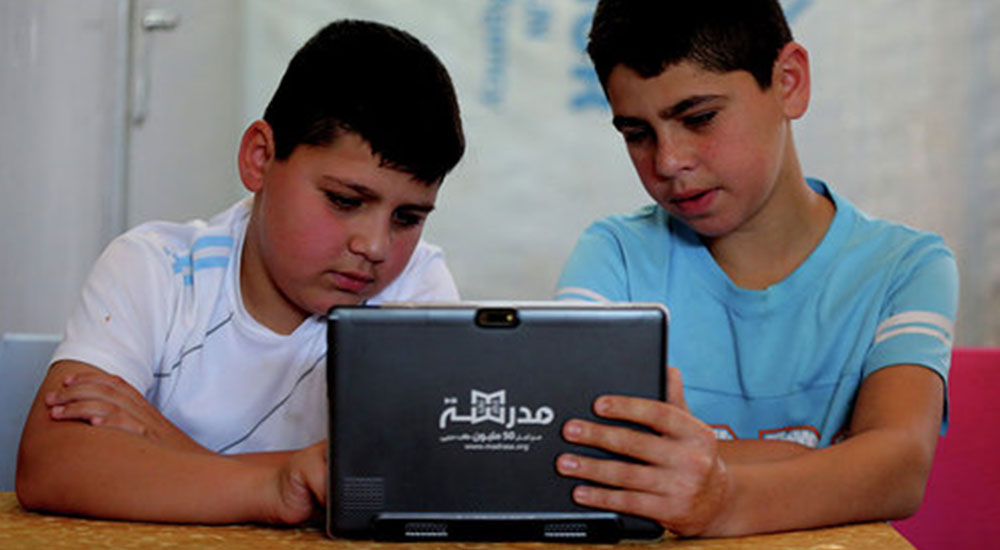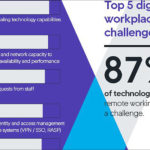Mohammed bin Rashid Al Maktoum delivers tech education to Jordan refugee camps

The Mohammed bin Rashid Al Maktoum Global Initiatives, MBRGI, continued providing high-tech offline educational solutions in Jordan’s refugee camps in its first mission amid the outbreak of Covid-19 pandemic. As part of Madrasa for 1,000 villages, the MBRGI equipped about 400 students and 11 teachers in Al Azraq Refugee camp and King Abdullah Park Refugee camp in Jordan with offline solutions to access over 5,000 high-tech science, math and Arabic video lessons without the need of internet access. For the first time, specialised Madrasa tablets were distributed to 62 children of determination in partnership with the United Nations Children’s Fund, UNICEF, at both refugee camps to ensure inclusive education.
In collaboration with the Emirates Red Crescent, the mission saw the distribution of four innovative offline solutions, ranging from Madrasa tablet, WiFi hotspot device, Madrasa flash memory and Madrasa smart bag, to ensure a rich virtual learning experience in remote areas and refugee camps as school closures leave millions of students worldwide out of classrooms. The team followed strict health guidelines and precautionary measures to provide a safe learning experience to children living in remote areas with limited access to basic resources amid the global pandemic.
Education for everyone
Syrian 8-year-old Eman, who lives with a hearing impairment in Al Azraq Refugee camp in Jordan, was among the beneficiaries who received her own Madrasa tablet. With no access to education since the outbreak of the Syrian civil war, Eman is now able to learn the sign language and lip reading, with the help of her teacher supported by Madrasa’s high-tech educational content available without internet access. The engaging and interactive content of Madrasa e-learning platform aims to improve the overall quality of education.
In numbers
Madrasa for 1,000 villages continues its mission to provide offline high-tech education to remote areas and refugee camps despite global flight suspensions amid the ongoing outbreak of the Covid-19 pandemic. Since the initiative’s launch in February 2019, offline innovative educational content has reached 630 villages in four countries, benefitting 15,668 students and teachers through 1,052 electronic devices. Beneficiaries in remote areas received 640 Madrasa tablets, 30 WiFi hotspot devices, 336 Madrasa flash memory and 23 Madrasa smart bags, each equivalent to a virtual classroom containing 20 tablets, a speaker and wireless charging station.
Offline innovative educational content has reached 630 villages in four countries, benefitting 15,668 students and teachers through 1,052 electronic devices
Madrasa aims to distribute its offline educational content to 192 remote areas across 25 countries. To facilitate distribution to a large number of students and teachers in villages and refugee camps, Madrasa has forged several partnerships with international and local non-government organisations including the Emirates Red Crescent, UNESCO and the Islamic World Educational, Scientific and Cultural Organization.
Tanya Chapuisat, UNICEF Representative in Jordan, stressed on the importance of ensuring inclusive education for refugees and children of determination during the ongoing crisis. “UNICEF forges partnerships to ensure continuity of education for all, regardless of circumstances. Innovative e-learning solutions will help bridge the technological gap during the Covid-19 outbreak and provide equal educational opportunities that respond to different needs. Developing high-tech agile solutions presents a critical need in modern education to enable us to cope with emergencies and crises like the Covid-19 pandemic,” said Chapuisat.
Dr Waleed Al Ali, Manager of Madrasa, said, “Our goal through Madrasa e-learning platform is to ensure continued access to education in our region regardless of any challenges and obstacles.” He added, “In addition to the existing difficulties in accessing remote areas, the Covid-19 pandemic presented a new challenge to our humanitarian work.”
Al Ali stressed that education remains a central priority in MBRGI’s work regardless. “Empowering people comes before anything else. Education is a fundamental right that needs to continue, if not at an intensified level, during any given emergency or crisis. It is with education that we empower our future generations to overcome similar future crises and ensure they are active partners in their society’s progress and development.”





